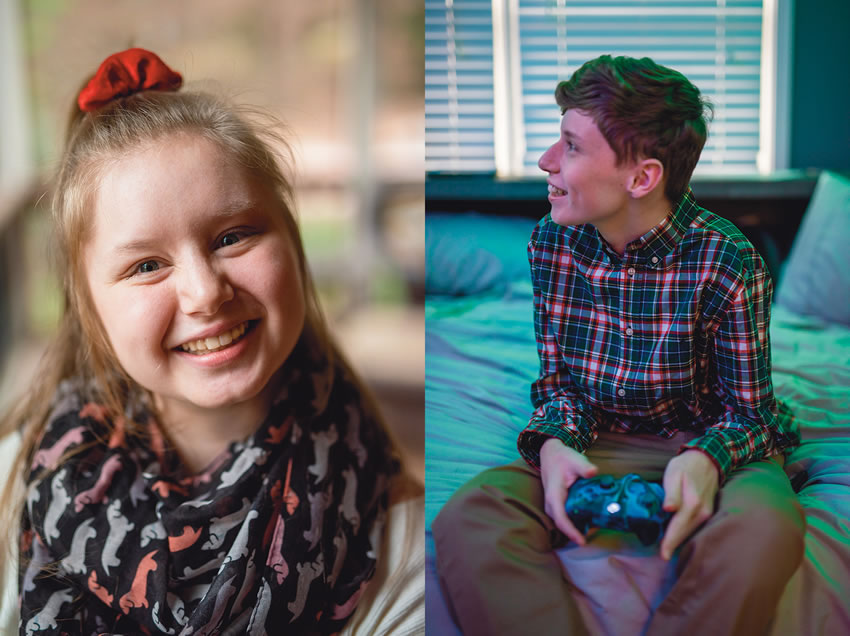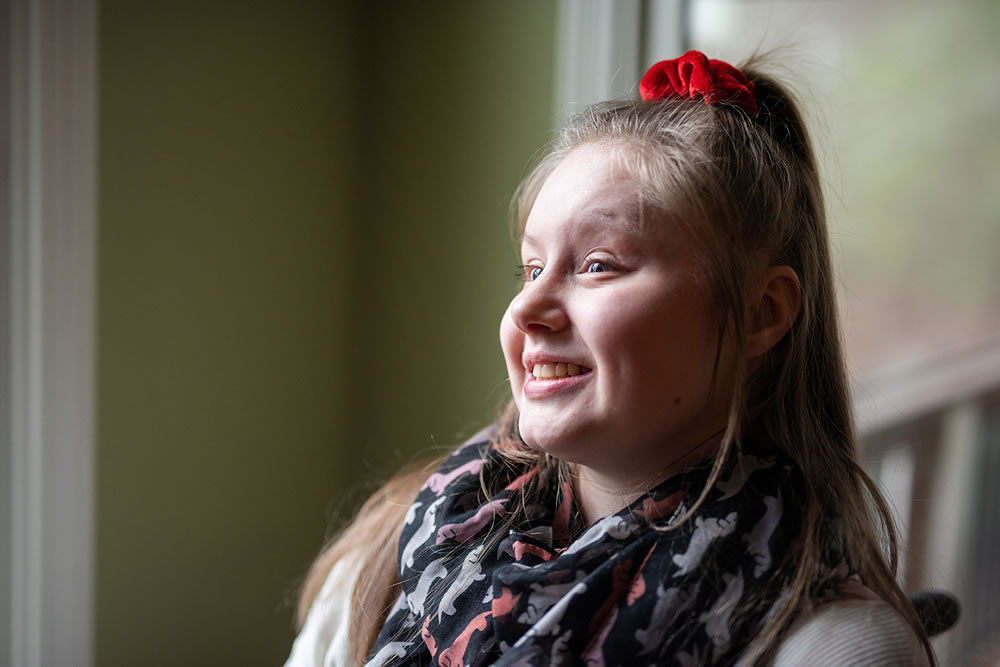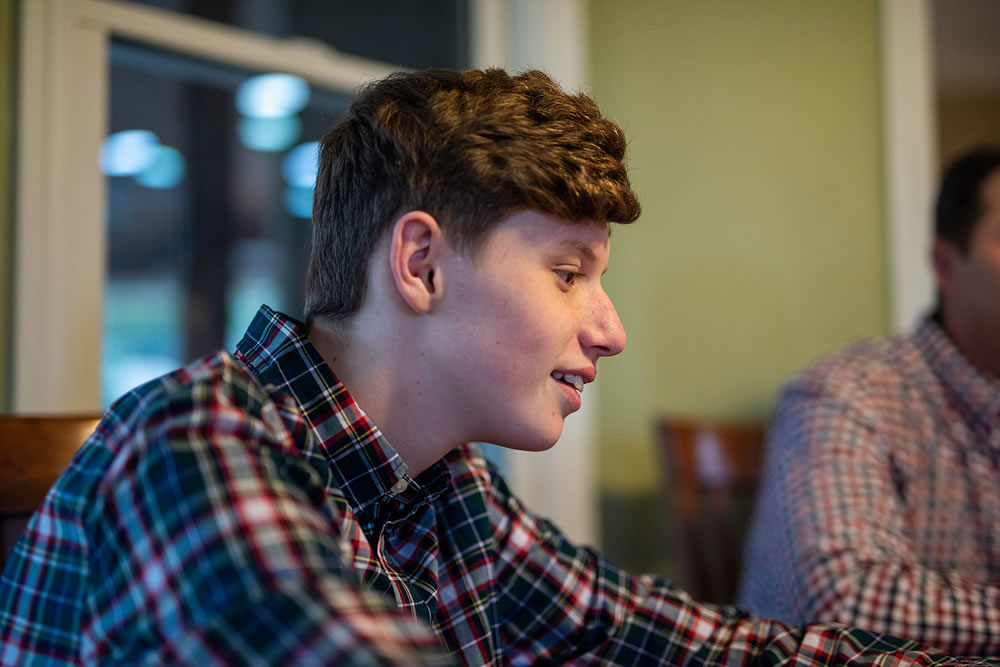Illuminating Unseen Dimensions
Sibling Dynamics
Science bonds Austin and Hannah Stacks — and sends their family to push for an FA cure.

On a Sunday afternoon, the Stacks family gathers around the dining room table for a round of their favorite family game: dominoes. The tiles spill out onto the table and each contestant scoops up their starting hands.
“We play Mexican train,” explains Jason, father, describing the rules. In their Southern household, this is the dominant version of the game. And the dominant player appears to be 17-year-old Hannah. Her brother, 13-year-old Austin, is on a mission to beat his older sister today — in fact, so is the rest of the family. She's been on a streak.
“I like being competitive,” Hannah says, giggling. “I really like beating him,” she motions toward Austin.
“I always beat her at Connect Four,” Austin retorts, staking his claim.
Hannah just smiles as she throws down another tile and instant looks of frustration stain the faces of her opponents.
“They fight like a true brother and sister,” says Candy, Hannah’s and Austin’s mother, who welcomes their bickering as a sign of normalcy in a household whose story has been anything but. Both Hannah and Austin were born with Friedreich's ataxia (FA), a genetically inherited disease where a mutation in the FXN gene causes a shortage of the protein frataxin, which is critical for mitochondria to function within cells. The disease generally starts to be symptomatic in childhood, hampering coordination, muscle control, and stamina, and leading to muscle loss. More serious symptoms — such as visual impairment, aggressive scoliosis, diabetes, and heart conditions — follow. FA has no approved treatments and no cure.
The Stacks family's horizons have shifted as they attempt to maximize enjoyment together and adjust to changing circumstances with grace.

Hannah’s disease is more advanced. She was diagnosed at age 6 and since then, her mobility has sharply declined. She started using a wheelchair for support when she was 9.
Jason and Candy work hard to make sure Hannah and Austin get their changing mobility needs met, and they’ve taken time to redesign parts of their family's two-story suburban home to accommodate these changes.
“We are just able to get by with what we have,” Jason says. They installed a chairlift to get Hannah up the stairs and renovated the kids' bathroom to make it wheelchair accessible.
Brother and sister
Despite her physical decline, Hannah approaches the world with gratitude and positivity — she is determined not to be defined solely by her condition.
“Even though FA is a big part of who I am, it is not all of me,” she says. She emotes kindness, especially toward other family members. “With my mom, I really feel like she's my best friend,” she says. “I really like talking to her. She'll help me through certain situations.”
Candy spends her weekdays at home with Hannah, teaching her through a homeschooling program. Hannah attended public school until her freshman year of high school, when going out to school was no longer sustainable.
“I miss going to school sometimes,” Hannah says. “But what's done is done.”
She enjoys focusing more on learning and less on the challenges of navigating a school not designed for her. “She was in advanced classes, but needed assistance,” Candy says. “They didn't have the right resources for her.”

Austin on the other hand, is immersed in the social life at public school, although perhaps less in his schoolwork. “I got tested and I have attention deficit hyperactivity disorder (ADHD), so it's a lot harder sometimes,” he says. “In some classes I participate, and in some, I don't.”
In his free time, Austin likes to play on his Xbox. “I like to play shooter games and car-racing games,” he says. Online, he has made numerous friends who square off against him regularly on the digital battlefield.
Finding suitable family activities has become difficult as the distance between Hannah and Austin's desires and abilities has widened. The whole family used to go camping together. Hannah once loved to go four-wheeling and horseback riding but had to give those up. Austin continues to play outside with friends whenever he can. The result is that the siblings often choose to spend their time quite differently. Candy and Jason see this as part of the natural progression of both sibling dynamics and the realities of living with FA. As parents, they have had to remain extremely engaged and flexible with what expectations they hold.
“For me it's helped speed things up,” Jason says. “Time is condensed. We bought Hannah a four-wheeler before I would've ever bought her one. Now, Austin has a really good four-wheeler. I took him skiing. He went skiing long before I ever went skiing when I was kid. We're trying to cram things in.”
One place where both Austin and Hannah can enjoy the outdoors and share a robust social life is the annual MDA Summer Camp in Georgia. Hannah has been attending Summer Camp since she was 7; it was the first place she met other kids affected by similar illnesses. She has continued to foster long-term friendships with several fellow campers who stay in touch year-round.
“It's nice to have community and people I can talk to as I get older, to understand what exactly FA is,” she says. “It's nice to see where I'm probably going to be at — hearing that my older friends have accomplished so much before then. It's really inspirational to know that I can complete stuff, too. And that even though I have FA, my life is not over.”
Advocating for family
Hannah’s words are soothing to her parents, who have fought hard to get their children proper care and support. Prior to Hannah's diagnosis, neither Jason nor Candy had ever heard of FA — no one in their family had ever shown symptoms. They’d struggled to have children.
“We fought for years,” Jason says, “through infertility, through multiple miscarriages, and we had a daughter. It was beautiful.” Austin followed a few years later.
When Hannah started preschool, her instructors first noticed something might be awry.
“She was trying to skip to her classroom,” Candy says. “The preschool director said, 'That doesn't look right ... I've seen hundreds and hundreds of kids, and she's not skipping correctly.'”
The comment flung open the doors to discovery. Over the next two years, Hannah endured countless appointments to figure out why she was falling and having trouble with coordination. Candy changed pediatricians and neurologists until she found proactive candidates. A pediatrician well versed in FA — she had two affected children of her own — quickly surmised that Hannah might have the disease. Things accelerated quickly from there, and Hannah received a final diagnosis via blood test. Within weeks, Hannah met with a neurologist at the Children’s Hospital of Philadelphia (CHOP) to learn more about her condition.
Hannah’s diagnosis raised serious questions about Austin, who was only 2 at the time.
“We agreed to wait to get him tested until we saw some outward symptoms,” Jason says. Candy and Jason were quick to recognize early signs. “It was at soccer,” Jason says. “We both looked at him — it was the awkward gait. His legs kind of swung out. I was like, 'Oh my God.' I looked at Candy and asked, 'Candy, you see what I see?'” The couple agreed to get him tested, and a month before his fifth birthday, Austin was also diagnosed with FA.
With two affected children, Candy and Jason swooped into action, getting involved with the FA Parents’ Group (FAPG) and the Friedreich's Ataxia Research Alliance (FARA) to educate themselves about the disease, meet other families, and pool resources. They organized their own wiffle-ball fundraiser event to support FARA.
“We didn't have a choice,” Candy says. “I didn't have a choice. I had to stand up and be there to take care of my kids. That's just what I do.”
Both parents are awaiting developments from drug companies for a treatment that will slow down or halt the disease progression.
“You can't have a fast enough path to a cure,” Jason says. “Time is precious. Every day matters. Every second matters.”
Amidst the challenges of living with FA, Hannah remains mature and relaxed. She regularly speaks to other kids her age with FA, imparting advice and sharing stories. Few things make her and Austin as happy as the family's two dachshund hounds, Katy and Leonard.
“I really love hanging with my wiener dogs,” Hannah proclaims. She sits on the family’s sectional sofa and the dogs crawl up into her lap, tails wagging. “He can literally do no wrong,” Hannah says, laughing as Leonard raises his nose to kiss her. Candy and Jason just shake their heads. Austin, too, loves to cuddle with the dogs — Leonard sleeps in his bed every night.
Austin and Hannah have found comfort in their surroundings and have learned to accept some of the hardships that come with FA while trying to live life to the fullest. Hannah, always astute, acknowledges all of the hard work that her parents put in to get her here.
“My mom and dad are just so supportive of anything I do,” she says, smiling. “I really appreciate that.”